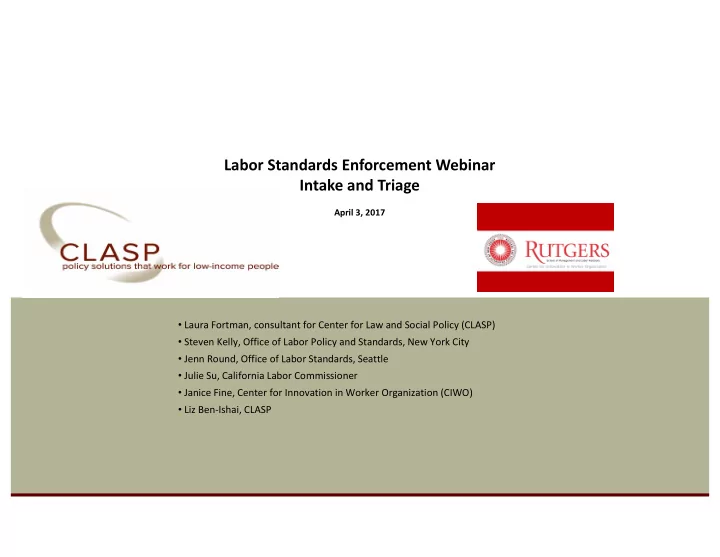

Labor Standards Enforcement Webinar Intake and Triage April 3, 2017 • Laura Fortman, consultant for Center for Law and Social Policy (CLASP) • Steven Kelly, Office of Labor Policy and Standards, New York City • Jenn Round, Office of Labor Standards, Seattle • Julie Su, California Labor Commissioner • Janice Fine, Center for Innovation in Worker Organization (CIWO) • Liz Ben-Ishai, CLASP
Cites and Counties (18) States (21) Advocacy and Research Orgs (13) • Arizona • Emeryville, CA • California Immigrant Policy Center • Chinese Progressive Association (San • California • Jersey City, NJ Francisco) • Los Angeles • Colorado County, CA • Economic Policy Institute • Connecticut • Employee Rights Center (San Diego) • Los Angeles, CA • District of Columbia • Fair Work Center (Seattle) • Minneapolis, MN • Hawaii • Mixteco/Indigena Community • Montclair, NJ • Maryland Organizing Project (Ventura County, • Montgomery • Massachusetts CA) County, MD • Michigan • National Employment Law Project • New York City, NY • Minnesota • Partnership for Working Families • Newark, NJ • Montana • PathWays PA • Nebraska • Oakland, CA • New Hampshire • Rutgers Center for Women & Work • Plainfield, NJ • San Francisco Day Labor Program & • New York • San Diego, CA Women's Collective • Ohio • San Francisco, CA • SEIU • Oklahoma • Seattle, WA • Young Workers United (San Francisco) • Oregon • Spokane, WA • Texas • Tacoma, WA • Washington • Wisconsin • Wyoming www.clasp.org 2
1. Introduction 2. How do intake and triage practices fit within the larger context of strategic enforcement? What do we mean by “strategic enforcement”? 3. Intake policies and practices 4. Triage policies and practices 5. Audience Q &A (and throughout) 3
Need for Resources > Available Resources Strategic Enforcement • Develop a Strategy for Achieving Compliance: ➢ Where are the greatest problems? ➢ Which workers are least likely to complain? ➢ Where will we have the greatest impact? www.clasp.org 4
Thinking Planning Evaluating Doing www.clasp.org 5
Laura Fortman, Consultant for CLASP, Former Deputy Administrator, Wage and Hour Division, U.S. Department of Labor Steven Kelly, Associate Commissioner, Office of Labor Policy and Standards, New York City Jenn Round, Enforcement Supervisor, Office of Labor Standards, Seattle Julie Su, California Labor Commissioner Janice Fine, Associate Professor, Rutgers School of Management and Labor Relations and Center for Innovation in Worker Organization Liz Ben-Ishai, Senior Policy Analyst, CLASP
• New York City • California
School of Management and Labor Relations What is triage? Triage is a system an agency uses to sort cases into different treatment categories and to decide which complaints to prioritize for full investigations, such as those where: • The worker is still employed • The issue is ongoing, not in the past • More than one worker is affected • Risk of retaliation is high • Wage theft is occurring frequently in the industry or occupation involved • Business is a repeat offender
Seattle OLS Priorities 1. Lower wages. 2. The private right of action doesn’t apply because the employer is too small or the alleged violation happened before the private right of action was an option; and 3. The economic recovery is so low that private counsel would not likely take the matter. 4. Employment status. 5. Retaliation. 6. Hotel Work Initiative. Possible Exceptions 1. OLS may take a case in one of the following priority industries even if the wages are above the cap: g. Personal & repair services (e.g. nail salons, a. Construction car washes) b. Food services and drinking places h. Retail trade c. Health care i. Security, building & grounds services (e.g. d. Home health care security guards, janitorial services, e. Hotel & motel landscaping f. Manufacturing, transportation & j. Social assistance, education & childcare warehousing 2. Employers - OLS may take a case that falls outside of priorities in one way or another if the employer is a priority or repeat offender.
QUESTIONS ● COMMENTS ● IDEAS
Strategies for Effective Investigations Tuesday, June 6, 10am PT/1pm ET
Recommend
More recommend